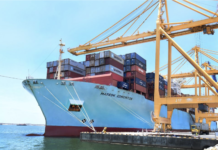
Swiss marine power company WinGD has completed shop tests for its innovative variable compression ratio (VCR) technology.
The results confirm that the latest X-DF engines equipped with VCR technology significantly cut methane emissions, achieving greenhouse gas (GHG) reductions comparable to high-pressure dual-fuel technologies. At the same time, these engines offer lower total system and fuel costs across various vessel applications.
WinGD Vice President Product Centre, Peter Krähenbühl, commented: “Over the past decade, we’ve worked to ensure that the unmatched reliability and low capital expenditure of X-DF engines are supported by the lowest possible overall GHG emissions. The fuel consumption and methane slip reductions achieved by VCR bring us to that point. Low GHG emissions will be fundamental for shipowners as carbon pricing measures take effect, which is why we have already seen strong uptake, with well over 100 new X-DF engines ordered with VCR so far.”
The VCR shop test took place at the Mitsui E&S DU (MESDU) facilities in Japan, where the first X-DF2.0 engines with VCR are being manufactured for NYK Lines’ bulk carriers. The six-cylinder, 62-bore engine demonstrated around a 30% decrease in methane emissions compared to an identical engine without VCR, bringing total methane slip down to approximately 0.83% of gas consumption—less than half the EU and provisional IMO default methane slip factor for low-pressure, low-speed dual-fuel engines. Engines with larger bores are expected to achieve even greater reductions.
In addition to reducing methane slip, the technology also delivers notable fuel savings, with up to 5.8% lower fuel consumption in gas mode and up to 6.9% in diesel mode. The accompanying charts illustrate how these improvements impact fuel costs and CO2 equivalent emissions when compared to previous X-DF engine technologies and a high-pressure engine counterpart, based on a typical car carrier operating profile.


By allowing automatic adjustment of engine compression ratio based on load, fuel type, and ambient conditions, VCR technology optimizes combustion efficiency. The solution is compatible with all new X-DF engines, and a retrofit package has already been installed on a pilot vessel, yielding promising early results.
Upcoming regulatory changes from both the EU and IMO will allow ship operators to report actual methane slip measurements rather than relying on default factors. This means that shipping companies can lower carbon costs by improving methane slip performance. WinGD is actively involved in shaping these regulatory frameworks through participation in key industry associations.
X-DF engines offer further advantages through their inherently low-NOx design and well-established emissions control strategies, as specified in the latest updates to the IMO NOx Technical Code. This ensures that WinGD does not need to adjust brake-specific fuel consumption figures or tolerances to meet evolving regulations.








